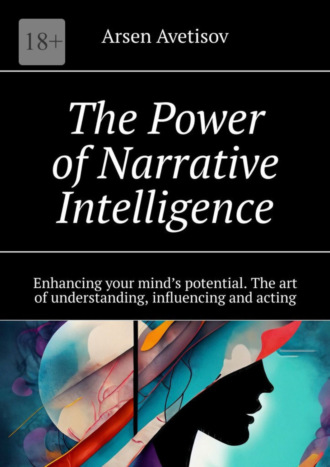
Полная версия
The Power of Narrative Intelligence. Enhancing your mind’s potential. The art of understanding, influencing and acting
The first concept is a person’s attitude to the surrounding reality. It is expressed in moods, feelings and actions, that is, it has an emotional and psychological basis.
The second is a set of views on the world, i.e. cognitive-intellectual concept, our doctrine of the surrounding world.
When people visualise their idea of the world, their attitude (emotional and psychological) goes up to the level where it becomes their set of views, their cognitive and intellectual doctrine.
This is a crucial point for understanding the mechanism that underlies the influence and creation of an objective or distorted picture of the external world in the mind.
Information about the world is received through the six sensory channels: vision (eyes), hearing (ears), taste (tongue), smell (nose), touch (skin), balance, position in space, weight, etc. (vestibular apparatus). Through these channels, we receive and conduct a preliminary analysis of information about the world around us.
Some things can be done from a distance, for example, through seeing and hearing. Other senses like touch, taste, and smell require direct contact or proximity. If one sense is impaired, other senses can compensate for it. For example, individuals with poor eyesight might have highly developed hearing and smell. This happens because the brain constantly seeks information and utilises all available sensory channels to do so. The information gathered creates a sense of security.
Until recently, all senses played relatively equal roles in shaping this sensory picture. People not only relied on sight and hearing but also on touch, smell, and taste. Not too long ago, they would literally taste gold coins and touch, smell, and try on objects when making purchases. The more sensory channels used, the more objective our perception of the world around us becomes.
How many of the six senses do people use to perceive the world in the last quarter of a century, compared to how many have been used over the past millennia? It turns out that with an increase in the amount of information received, the multichannel nature and, consequently, the objectivity of its perception decreased.
Now, a lottery which lures you to guess five numbers out of 36 is a game of chance and luck. The odds of winning are lower than the margin of error. People mostly rely on only two out of the six possible senses for their perception. The likelihood of accurately perceiving reality is probably still higher than winning the lottery. But to what extent?
Reflection, Imitation, Learning
Mirror areas, or how we learn.
To succeed in the world it is not enough to be
stupid, you must also be well-mannered.
Конец ознакомительного фрагмента.
Текст предоставлен ООО «Литрес».
Прочитайте эту книгу целиком, купив полную легальную версию на Литрес.
Безопасно оплатить книгу можно банковской картой Visa, MasterCard, Maestro, со счета мобильного телефона, с платежного терминала, в салоне МТС или Связной, через PayPal, WebMoney, Яндекс.Деньги, QIWI Кошелек, бонусными картами или другим удобным Вам способом.


